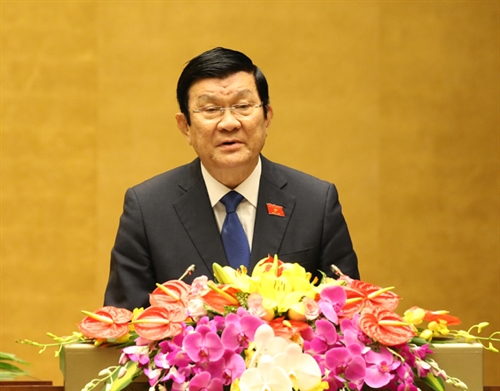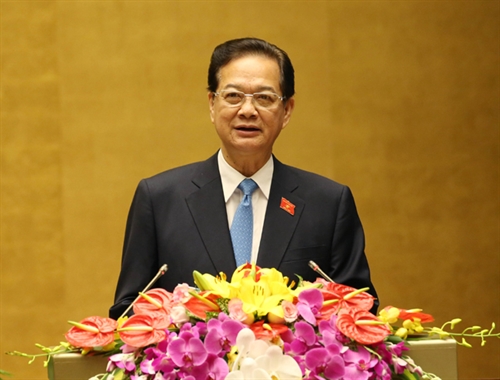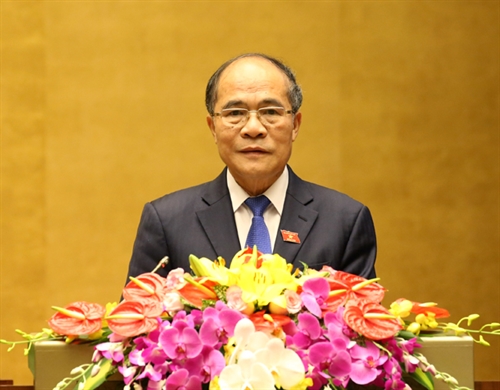 Politics & Law
Politics & Law

 |
| President Trương Tấn Sang. — VNA/VNS Photo An Đăng |
HÀ NỘI (VNS) —
All the sessions were broadcast live on national TV and radio.
President Trương Tấn Sang reported that over the past five years, amid complicated developments regionally and globally and with socio-economic difficulties at home, the president co-ordinated with legislative, executive and judicial agencies; the Việt Nam Fatherland Front (VFF); political-social organisations; ministries; localities; people and voters nationwide to fulfill his assigned tasks effectively in line with the Constitution and laws.
The president, along with the Party, population and army, helped implement the 11th National Party Congress’s resolution and the guidelines of the Party, the policies and laws of the State, and the resolutions of the 13th NA.
Regarding tasks and goals for the time ahead, Sang stressed the need to team up with the NA and its Standing Committee.
Other obligations include building and perfecting the legal system to institutionalise the content of the Constitution and the 12th National Party Congress’s resolution, and make proposals to complete a number of legal documents relating to the president’s tasks and powers.
At the same time, the president should continue instructing relevant agencies in implementing the programme on judicial reform for 2016-2020, to build up a strong body of judicial officials.
The leader should also enhance his co-ordination with the VFF and its member organisations, while meeting more often with voters at home and abroad, thus promoting democracy.
 |
| Prime Minister Nguyễn Tấn Dũng. — VNA/VNS Photo Nhan Sáng |
Prime Minister Nguyễn Tấn Dũng also gave a report on the Government’s and his performance during the 2011–2016 term.
He said that he and the cabinet focused on controlling inflation, stabilising the economy and ensuring sustainable growth. The annual gross domestic product growth rate averaged 5.9 per cent during the period, reaching 6.68 per cent in 2015 – the highest since 2008.
They pushed ahead with economic restructuring and changed growth models. They initially succeeded in improving the economy’s productivity, effectiveness and competitiveness.
To build a socialist-oriented market economy, the Government focused on creating an equal-competition environment, increasing administrative reforms, developing skilled manpower, reforming education and building synchronous infrastructure – especially when it came to transportation and facilities in big cities.
It also spent time fixing draft laws, ordinances and guiding documents to ensure their legality, unanimity, transparency and feasibility.
The Government also consolidated its apparatus, addressed management overlaps and shortages, and fine-tuned regulations at the provincial and district levels, the PM said.
In the report, he acknowledged certain shortcomings in the cabinet’s performance, such as its failure to make accurate predictions, which led to setting some unrealistic socio-economic development targets, and developing some mechanisms and policies that were unfeasible and lacked vision.
He also pointed out flaws in ensuring the State budget was collected and spending was balanced. Mistakes were also made handling public debt, using loans in several projects, expanding domestic and foreign markets for Vietnamese goods, and fighting smuggling and counterfeiting.
Based on the country’s successes and failures over the last five years, Dũng concluded that it is critical to swiftly institutionalise the Party’s guidelines, the Constitution and the State’s laws, and assure the nation’s and people’s interests are kept in mind.
He stressed that it is of paramount importance to make precise assessments about reality; set forth appropriate targets, tasks and solutions; and win the public’s support. The more challenges that occur, the more effort must be made to boost social welfare and raise people’s living standards, particularly in rural, ethnic minority and disadvantaged areas.
Meanwhile, people’s right to self-mastery had to be promoted, and they should be considered the beneficiary of development, he added.
Concurrently, national defence and security must be strengthened to safeguard independence, national sovereignty and territorial integrity. It was also necessary to optimise domestic strength, integrate into the world, attract and capitalise on external resources, and raise Việt
 |
| National Assembly Chairman Nguyễn Sinh Hùng. — VNA/VNS Photo An Đăng |
National Assembly Chairman Nguyễn Sinh Hùng, in his report, hailed the NA for upholding its sense of responsibility in performing its lawmaking and supervising duties, as well as making decisions on key issues, and contributing to national construction and development.
The NA has fulfilled the goal of devising and adopting the 2013 Constitution and institutionalising Party guidelines – especially the platform for national construction in the period of transition toward socialism, which was revised in 2011.
It also issued the largest number of legal documents in a single tenure. As of the end of the NA’s 10th session in November, the legislature had promulgated 100 laws and codes. Seven other bills were also scheduled to be passed at the NA’s 11th session, he said.
Hùng said the NA was better this time around at responding to the people’s requests and aspirations, and helping stabilise the economy and ensuring social welfare, national defence and social order.
He also stressed that an open question-and-answer style was the most effective form of supervision, thereby creating positive change and consensus on awareness and action in the State apparatus.
Citing lessons drawn from the 13th NA, Hùng called for upholding the sense of solidarity, as well as continuing with strong ideals of democracy, openness and transparency in organisation and operation. He said these were driving forces for the power, creativity and dynamism needed to fulfill goals.
Each NA deputy was urged to listen to the public’s opinions and suggestions so the NA’s decisions could be made promptly, meeting the people’s needs.
According to him, the quality of legislators elected plays a decisive role in improving the NA’s capacity.
Full-time lawmakers performed their role as a core force in the NA’s activities increasingly well, he said.
Furthermore, increased co-ordination with the president, the Government, the Central Committee of the Việt Nam Fatherland Front, the Supreme People’s Court, the Supreme People’s Procuracy and agencies would generate a collective power to fulfill assigned tasks.
Speaking about goals for the future, the NA chairman stressed the need to accelerate lawmaking activities, and improve the quality of laws and major decisions.
At the same time, key socio-economic projects should be supervised closely, while the number of full-time deputies should be increased, he said. — VNS